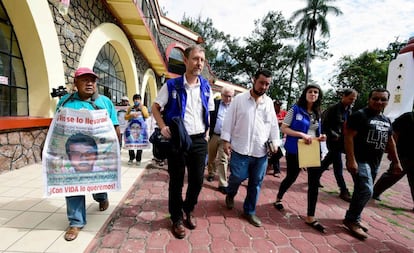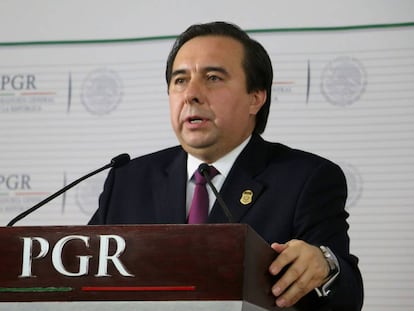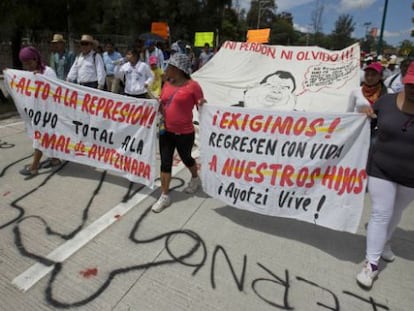UN: “The Ayotzinapa case remains unsolved”
Representative for Human Rights in Mexico says that the Iguala murders “can’t go unpunished”


Jan Jarab, the representative of the Office of the High Commissioner for Human Rights in Mexico, was unequivocal on Wednesday in Ayotzinapa. Speaking on the second anniversary of the disappearance of 43 student teachers from the town, he stated that the case remains unsolved. “And it can’t go unpunished,” he added.
The United Nations’ visit to the town has been seen as a clear sign of support for the families of the victims and their tireless fight for truth and justice.
“I want to make clear my admiration for your determination and for what you have achieved,” Jarab said. “[Even today] the whereabouts of the 43 remain unknown and we do not have any guarantees that all those who bear criminal responsibility in this case will be punished,”
I want to make clear my admiration for your determination and for what you have achieved Jan Jarab
His statement has done even more damage to the official account of events. Although it has reached out to the victims’ families over the last few months, the Mexican government considers the case closed. According to the official story, on the night of September 26 and early morning of September 27, 2014, municipal police in Iguala delivered the students to the Guerreros Unidos cartel, who thought they were from a rival gang. Guerreros hitmen are said to have killed them and burned the bodies at a garbage dump site in Cocula, a nearby town.
That theory, from the Mexican General Attorney’s Office, was presented as “historical truth,” but it drew a number of detractors from the beginning. It provides no motive (Why would the cartel kill 43 students?), and suspicions about the location where the remains were found has hurt the credibility of the experts who worked on the case so much that Attorney General Jesús Murillo Karam and lead investigator Tomás Zerón resigned.
Suspicions about the location of the remains has hurt the credibility of the experts
Though the federal government offered critics the heads of Karam and Zerón, it failed to build bridges and connect with the victims’ families. Relatives say they will continue to believe the students are alive until their deaths are proven. Jarab, mindful of this conflict, tried to ease tensions by praising the government for following up with relatives and police. “My personal opinion is that in the last few weeks we have seen some indication that they are investigating other leads,” Jarab said.
The victims’ families gave the UN representative a necklace of carnations during the visit. They welcomed him and bid him farewell by chanting: “They took them alive, we want them back alive.”
English version by Dyane Jean François.
Tu suscripción se está usando en otro dispositivo
¿Quieres añadir otro usuario a tu suscripción?
Si continúas leyendo en este dispositivo, no se podrá leer en el otro.
FlechaTu suscripción se está usando en otro dispositivo y solo puedes acceder a EL PAÍS desde un dispositivo a la vez.
Si quieres compartir tu cuenta, cambia tu suscripción a la modalidad Premium, así podrás añadir otro usuario. Cada uno accederá con su propia cuenta de email, lo que os permitirá personalizar vuestra experiencia en EL PAÍS.
En el caso de no saber quién está usando tu cuenta, te recomendamos cambiar tu contraseña aquí.
Si decides continuar compartiendo tu cuenta, este mensaje se mostrará en tu dispositivo y en el de la otra persona que está usando tu cuenta de forma indefinida, afectando a tu experiencia de lectura. Puedes consultar aquí los términos y condiciones de la suscripción digital.










































